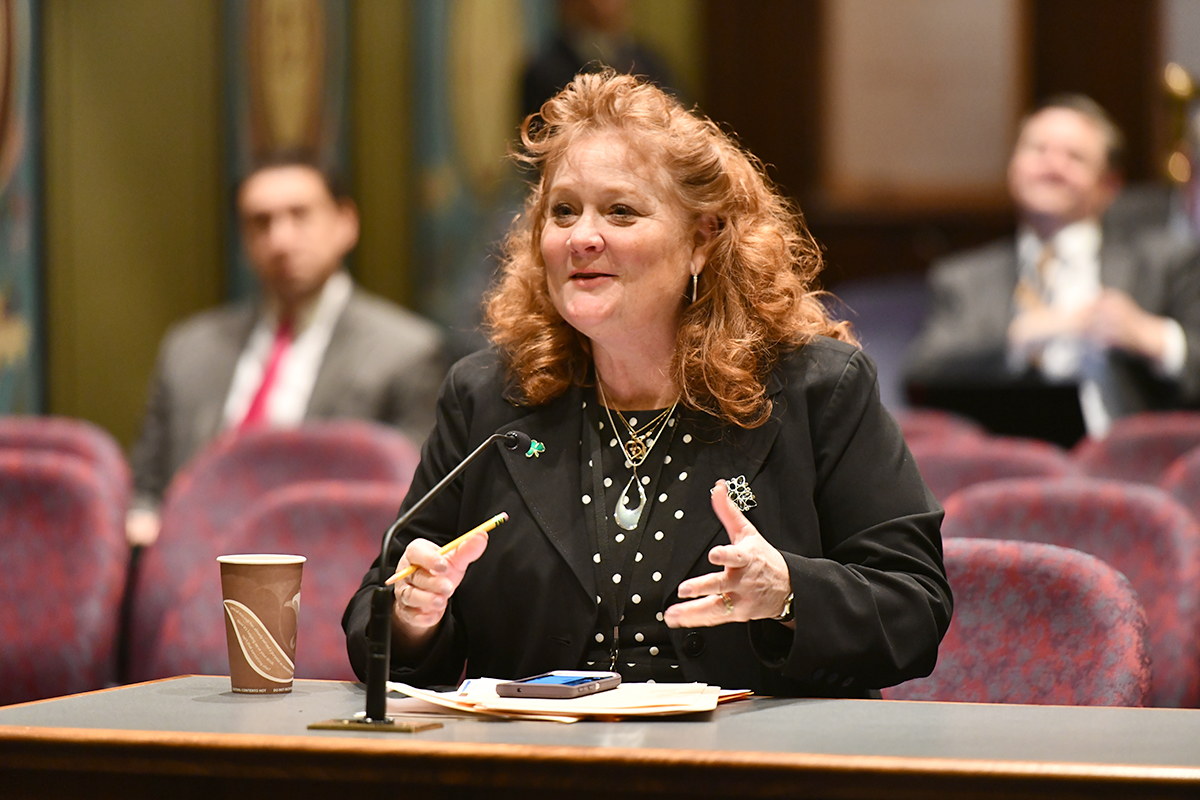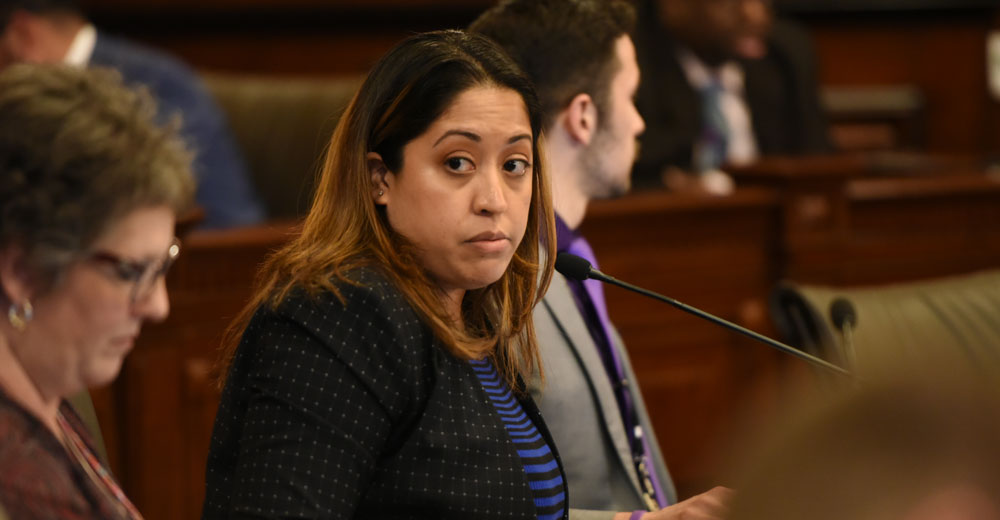- Details
- Category: Senator Laura Murphy News
 DES PLAINES – To comfort individuals who may be concerned about identity theft after recent reports of unemployment fraud, State Senator Laura Murphy (D-Des Plaines) assures Illinoisans the Illinois Department of Employment Security is aggressively cracking down on fraudsters filing false claims and encourages victims to file a report.
DES PLAINES – To comfort individuals who may be concerned about identity theft after recent reports of unemployment fraud, State Senator Laura Murphy (D-Des Plaines) assures Illinoisans the Illinois Department of Employment Security is aggressively cracking down on fraudsters filing false claims and encourages victims to file a report.
“This problem isn’t just affecting a few people—nationwide, scammers are using the uncertainty of the pandemic to take advantage of vulnerable people,” said Murphy. “If you believe you’ve been the victim of fraud, report it immediately. With your help, we can hold these scammers accountable.”
Last week, reports surfaced of individuals receiving KeyBank debit cards and unemployment letters in the mail, despite never having applied for benefits. According to IDES, people who received these erroneous mailings may be targets of fraud.
After receiving these reports, IDES uncovered and launched an investigation into a nationwide fraud scheme targeting applicants to the federal Pandemic Unemployment Assistance (PUA) program. IDES said ambiguous federal guidelines—developed hastily to respond to the COVID-19 pandemic—leave PUA claimants open to attack. IDES maintains this scheme is not connected to the PUA program access issue experienced in May.
A dedicated team of staffers is now working directly with individuals whose identities are being used or have possibly been stolen. The department is also working with local and federal law enforcement authorities to pursue and prosecute those committing fraud.
Individuals who have received debit cards in the mail without applying for benefits should call IDES immediately at 1-800-814-0513 to report identity theft. Do not activate the debit card.
Victims of fraud are also encouraged to check their credit reports for possible suspicious activity, post a fraud alert and visit the Federal Trade Commission’s website for helpful tips on recognizing and reporting identity theft.
- Details
- Category: Senator Jennifer Bertino-Tarrant News
 PLAINFIELD — As a result of our current situation, some people are forced to stay in dangerous situations because they have nowhere else to go.
PLAINFIELD — As a result of our current situation, some people are forced to stay in dangerous situations because they have nowhere else to go.
State Senator Jennifer Bertino-Tarrant (D-Shorewood) is reminding people the importance of reporting suspected abuse, neglect and exploitation of all people — but especially those who may not be able to speak up on their own, including older adults and people with disabilities.
“Victims of abuse can be too afraid to report on their own, or do not have the means to do so,” Bertino-Tarrant said. “It’s up to everyone to be aware of the signs of abuse and keep an eye on neighbors, customers, and our loved ones.”
Alongside the Illinois Department on Aging, Bertino-Tarrant is advocating to protect seniors and adults with disabilities from abuse. The three-year campaign — pegged as Engage2Change — received a $2.1 million grant from the federal Administration for Community Living.
Through the use of television, email marketing and other digital platforms, the campaign will focus on educating people about the signs of abuse and encouraging them to do their part to prevent future problems.
“People who suspect abuse should report it immediately,” Bertino-Tarrant said. “We need to ensure those who need help get it as soon as possible.”
People who are victims of abuse, neglect or financial exploitation — or know someone who is a victim — are encouraged to call the Department on Aging’s 24-hour abuse hotline at 866-800-1409, or visit illinois.gov/aging/engage. Trained professionals are available to take reports of suspected abuse and forward them to local adult protective service agencies.
- Details
- Category: Senator Celina Villanueva News
 CHICAGO – After President Trump released a memorandum that calls for an unprecedented change that would exclude undocumented residents from the U.S. Census, State Senator Celina Villanueva (D-Chicago) released the following statement:
CHICAGO – After President Trump released a memorandum that calls for an unprecedented change that would exclude undocumented residents from the U.S. Census, State Senator Celina Villanueva (D-Chicago) released the following statement:
“Both citizens and non-citizens have been included in the official count since the first U.S. Census. The purpose of the census is to count all residents, regardless of status, so that the communities they live in receive adequate resources and accurate representation.
Read more: Villanueva: Immigrant communities will not be silenced in the census
- Details
- Category: Senator Scott Bennett News
 URBANA – In an effort to help young adults find jobs during the pandemic, State Senator Scott Bennett (D-Champaign) supported the Illinois Department of Human Services’ COVID-19 Summer Youth Employment Program, which provides employment opportunities for youth in the community.
URBANA – In an effort to help young adults find jobs during the pandemic, State Senator Scott Bennett (D-Champaign) supported the Illinois Department of Human Services’ COVID-19 Summer Youth Employment Program, which provides employment opportunities for youth in the community.
“Young adults are facing a tough job market because of the pandemic,” Bennett said. “This program is a unique opportunity for young workers to gain valuable work experience during these tough times.”
The state has dedicated $9.3 million to the program to employ low-income youth living in areas most affected by the pandemic.
Urbana Neighborhood Connections is one of 30 youth employment providers and will receive $500,000 to employ 100 youth workers for the next three months. Employees will be matched with work-based learning opportunities based on their age, ability and experience, and will take part in career development training.
For more information about Urbana Neighborhood Connections program, contact Michelle Turner at 217-898-1019 or
- Details
- Category: Senator Scott Bennett News
 CHAMPAIGN – Since the COVID-19 crisis began, pandemic-related scams have been on the rise, and State Senator Scott Bennett (D-Champaign) is urging residents to stay vigilant so they do not fall victim.
CHAMPAIGN – Since the COVID-19 crisis began, pandemic-related scams have been on the rise, and State Senator Scott Bennett (D-Champaign) is urging residents to stay vigilant so they do not fall victim.
The most recent scam involves potential unemployment debit card fraud. Some Illinoisans have reported receiving a KeyBank debit card and an unemployment letter from the Illinois Department of Employment Security (IDES) despite never having applied for unemployment.
“Scammers are attempting to take advantage of this uncertain situation and commit unemployment fraud,” Bennett said. “Ineligible residents who receive an unemployment debit card should report it immediately and make sure their personal information has not been compromised.”
IDES confirmed individuals who have not filed for benefits but received a debit card or unemployment letter could be the target of fraud. Anyone who has received a debit card without filing should contact their local police department and report the incident with IDES.
- Details
- Category: Senator Jacqueline Y. Collins News
 CHICAGO – In the wake of a mass shooting at a Gresham funeral that wounded at least 15 people, State Senator Jacqueline Collins (D-Chicago) expressed her support of the victims, asked those with knowledge of the crime to come forward and called for city and state government to act to address the root causes of violence.
CHICAGO – In the wake of a mass shooting at a Gresham funeral that wounded at least 15 people, State Senator Jacqueline Collins (D-Chicago) expressed her support of the victims, asked those with knowledge of the crime to come forward and called for city and state government to act to address the root causes of violence.
“We face two pandemics in Chicago. Both spread and perpetuate themselves. And we already know how to end both,” Collins said. “We know the solution to the coronavirus is to bring our resources to bear to support public health and follow the science. We know that to end the pandemic of violence we need to stem the flow of guns, drugs and gangs, and address the poverty, disenfranchisement and criminalization of communities of color in Chicago.”
Collins also urged the city’s leaders and the community to come together to end the shootings. Gresham has experienced a spike of violence this year, and reports indicate last night’s shooting was a retaliation in an ongoing, deadly feud.
“Rabbi Abraham Joshua Heschel once wrote that ‘Few are guilty, but all are responsible,’” Collins said. “Those with knowledge of these crimes must come forward and work with police. And it must be said that police need to foster a relationship of trust that starts with reform and accountability. This has to be a two-way street.”
Collins cited a number of recent actions the General Assembly has taken in an attempt to fix the root causes of violent crime in Chicago. The state legislature created the Commission on the Elimination of Poverty to explore ways of ending the cycle of poverty in Illinois. Collins was among those who supported a minimum wage increase to $15, which will proceed in stages over the coming years, as well as the legalization of cannabis for adult use with the most robust social equity provisions in the country’s history. In addition, Collins advocated for increased funding for violence prevention, youth employment and Teen Reach programming in the FY 21 Budget. Collins is in the midst of acting to address the vast disparity in banking and home lending between white and Black and brown communities.
“Gresham is an epicenter of these two pandemics, and for the same reasons. We can’t give up on our efforts to end them simply because the solutions are costly or inconvenient to those in power,” Collins said. “A person who wears a mask protects another from COVID-19. A child with a bright future and a supportive society does not pick up a gun. We know how we need to act, and we need to act now.”
- Details
- Category: Senator Rachelle Crowe News
 COLLINSVILLE –State Senator Rachelle Crowe (D-Glen Carbon) joined area legislators and officials with the Illinois Department of Transportation in Collinsville Tuesday to announce funding for the Metro East’s next projects as part of the state’s ongoing multi-year construction plan.
COLLINSVILLE –State Senator Rachelle Crowe (D-Glen Carbon) joined area legislators and officials with the Illinois Department of Transportation in Collinsville Tuesday to announce funding for the Metro East’s next projects as part of the state’s ongoing multi-year construction plan.
“Although Illinois is experiencing vast economic issues during the COVID-19 pandemic, this announcement comes at a time when residents need good-paying, labor jobs as well as reliable transportation,” Crowe said. “By investing in our state’s infrastructure, we’re committing to both of these necessary expectations.”
In total, the governor announced the state’s $21.3 billion plan to improve Illinois roads and bridges over the next six years. The program will create hundreds of thousands of job opportunities for residents across the state.
Earlier this year, construction began on multiple projects within the Rebuild Illinois plan, including the ongoing $67 million Interstate 255 rehabilitation project in St. Clair and Madison counties. The project is expected to be completed on time.
Passed in 2019, IDOT’s complete Multi-Year Plan can be found here.
- Details
- Category: Senator Sara Feigenholtz News
 CHICAGO – Earlier this week, the Trump administration announced a plan to deploy agents from the Department of Homeland Security to Chicago to respond to local unrest. State Senator Sara Feigenholtz (D-Chicago) released the following statement:
CHICAGO – Earlier this week, the Trump administration announced a plan to deploy agents from the Department of Homeland Security to Chicago to respond to local unrest. State Senator Sara Feigenholtz (D-Chicago) released the following statement:
“The president continues to wreak havoc and chaos across our country by determining that Homeland Security agents should be sent to Chicago,” Feigenholtz said. “There is no way to identify them, no specific purpose for their deployment, and they have no business coming to our city. The Trump administration’s actions provide nothing more than an endless list of failures since the day this administration began.”
The news comes just days after federal agents were deployed to Portland, Oregon. Quickly, footage of these agents using excessive force on protesters surfaced, leading many to fear similar acts of violence may occur in Chicago.
“If the president is truly concerned about the well-being of Chicago residents, then he should do something to address the public health crisis we’re currently facing instead of risking further serious injuries by sending in federal agents,” Feigenholtz said.
The Trump administration has not released any information about when the deployment of federal agents is scheduled to occur.
More Articles …
- Morrison announces job creation for underserved youth
- Bush warns of IDES debit card fraud
- Feigenholtz: AJ Freund case a reminder that there is still work to be done
- The Majority Report 07/20/20 - A call for the death penalty to be abolished, memorializing MLK Jr.'s speech and more Asian Americans in the Senate
Page 651 of 765













 © 2026 Illinois Senate Democratic Caucus
© 2026 Illinois Senate Democratic Caucus